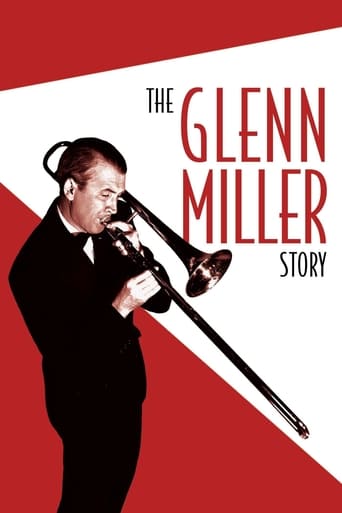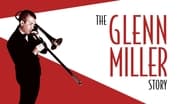weezeralfalfa
Dramatizes the prolonged struggles of Big Band icon Glenn Miller to front his own financially viable band and to discover a signature band sound that audiences would embrace. It also serves as a tribute to his many popular songs after he discovered the band sound he was looking for. It also dramatizes his much resisted, eventually successful, attempt to somewhat modernize military march music, as exemplified by his "St. Louis Blues March", and his many off-the-parade-field entertainment performances for the troops and UK civilians, either live or via radio. It includes renditions of a dozen or so of his standards, plus various other numbers. The musical aspects are nicely mixed with his personal life, including financial woes, and his initially problematic resumption of his romantic relationship with his future wife, Helen(June Allyson). Once they connect, June is consistently a major player in the film. Fictional Chummy MacGregor(Harry Morgan) serves as Glenn's constant music and personal buddy throughout. After Glenn joins the service, he seems to be acting as his substitute in the Miller household. Buddy teams, of course, were a common device in Hollywood films. Sometimes, the two often were at odds with each other(reluctant buddies), which much added to the drama and comedy. The Dorsey brothers provided a real life example, much exploited in their biop. No such conflicts here. Of course, many of the specific details in Miller's personal life presumably were improvised.If you prefer to have the real Glenn Miller present in the film, you will have to try to find an old VHS or DVD copy of the two films that featured his band : "Sun Valley Serenade" and "Orchestra Wives". I rate the former as more entertaining than the present film, with the latter film being less so. I rate John Payne's character in the former film, as not far behind Jimmy Stewart, who plays Miller in the present film. However, Sonja Henie, the lead female in the former film, is much more interesting than June Allyson's character in the present film. Her impish character, determined to steal her chosen man from his fiancé, skiing and ice skating exhibitions, and occasional dancing and singing scenes, are far superior entertainment to June's rather bland character, admittedly constrained by historical considerations. Sonja added a youthful charm and spunkiness that June often brought to her '40s films, where she often included some dancing and singing, but which had somewhat faded in her '50s films, where she usually did straight dramatic roles.The present film includes about twice as many Miller standards as in "Sun Valley Serenade", including 5 numbers featured in that film, but excluding the theme song "It Happened in Sun Valley". Several were done more interestingly in that film. "I Know Why", from that film, was being played when Miller's trumpet player supposedly split his lip(looks very fake!), supposedly instigating Miller to conceive his signature band sound. None of the several new Miller standards from "Orchestra Wives" was included in the present film. "Little Brown Jug", not included in either of these films, pops up several times in the present film, including being the last song featured in the film, broadcast from Paris, after Miller's disappearance. Along with "Moonlight Serenade", it functions as the personal theme song for Glenn and Helen.Jimmy Stewart was an excellent choice to play Miller. We don't usually think of him as being a musical actor. However, in his pre-Hollywood days, he did some singing and musical instrument playing. In a few of his early films, he did a bit of singing, and played a music teacher and musical instrument store owner in "Pot 'O Gold". I wonder, if Miller had lived, would he have been asked to play himself in this film, as did the Dorseys in their film biop? Based on his performance in his two Hollywood films, Stewart provided a more pleasing personality and was much more at ease in films.June was also a good choice as Miller's sweet cheerleading wife, she and Stewart having been a popular lead team in "The Stratford Story". However, I found that this older June had lost some of her youthful appeal. She began her Hollywood career about a decade earlier, mainly as a singer/dancer with down home charm. Unfortunately, her historical role in this film didn't allow her any stage singing or dancing.In contrast to Miller and Helen, I liked the upbeat early version of "Moonlight Serenade", with words and a stage dancing routine. It's nice to try out radically different arrangements and contexts of standards. I also liked the too brief instrumental partial rendition of "Over the Rainbow", although this had not yet been composed in the historical period dramatized. ..The buzz bomb during the outdoor playing of "In the Mood" reminds us of the danger to Brits at home, even late in the war. However, recent thinking is that probably Glenn died from a British bomb ejected in a no-fly zone over the English Channel. The poor weather, as suggested in the film, may have contributed to this tragedy.
daviddaphneredding
Very many ages back, as a boy of almost eight years of age I saw this movie, enjoyed it, and now am glad I have seen it recently. James Stewart is in one of his best roles as the man who was a pioneer in music. June Allyson was wonderful in her role as Miller's sweet, loving wife Helen. (Although Allyson was only a year younger than my late mother, even as a little boy I was always "in love" with that pretty movie star.) Harry Morgan and George Tobias were very good as the supportive friends of both the man and his wife. The '30's were well-depicted. Of course, what drew people to this movie, I would dare say, were the best of Glenn Miller's songs; "Pennsylvania 6-5000", "Moonlight Serenade", "Tuxedo Junction", and "String of Pearls" were, and are, among my favorites. Romance, good acting, occasional comedy, and definitely good music always make for a great movie, and all these elements were found in this outstanding classic.
vincentlynch-moonoi
This is an exceptionally fine bio-pic. From beginning to end, the entire filming was handled just about as perfectly as one could desire. The story does not need to be reviewed here, because it's the well known story of how Glenn Miller got started, his early tribulations, his ultimate success, and his death in WWII.There are a number of factors that make this film so good, chief among them the chemistry between Jimmy Stewart (as Glenn) and June Allyson as his wife. They were exceptionally good together in a total of 3 films. This is one of Stewart's most pleasing performances! The music here is also excellent, and from what I understand, these are the best renditions of the Miller Sound ever made due to technically more impressive recordings than some of the original recordings (of course, most of these tunes come from the 40s, while these recordings were made in the mid-1950s).While it is very much Stewart's and Allyson's picture, the supporting cast does a fine job, as well. Harry Morgan is very pleasing here as friend and pianist. Charles Drake is fine as an associate. George Tobias, almost always fun, is very pleasant here. And Barton MacLane plays a good guy here as General Hap Arnold. There are also a number of "guest appearances" that are really special -- Louis Armstrong, Gene Krupa, Frances Langford, and others.The photography and color are great, although in the version currently being shown on TCM, there seems to be a slight color issue late in the film...but not enough to detract from enjoying the film.Again, an excellent biopic that didn't inspire me to buy the DVD, but did inspire me to download the soundtrack! Highly recommended.
writers_reign
This hews pretty strictly to the standard biopic formula when the subject is a performer and/or composer, lyricist; the formula is in three-parts comprising Early Struggles, Breakthrough, with the last third a celebration of the subject's Greatest Hits. The majority of biopics also reserve the right to 'tamper' with facts and chronology and this is no exception; long before the band is established - i.e. 1937/38, it finally 'made it' in 1939 - they are heard running down Over The Rainbow which was, of course, written in 1939 for The Wizard Of Oz and similarly they are heard playing - in 1939 - I Know Why, which was written, by Harry Warren, for their first film, Sun Valley Serenade, in 1941. There are other examples; the film clearly implies that Miller was a native of Colorado when in fact he was born in Iowa, moved as a child to Nebraska, and didn't reach Colorado until his teens, also he never saw his second adoptive child, a daughter, yet she is featured in a central scene when Helen brings her from the orphanage on their tenth anniversary.This leaves us with arguably the main event: the music and here it is not so easy to quibble; anyone who likes Miller's records will like the film; it's as easy as that. Jimmy Stewart was a stranger to bad performances and even June Allyson's saccharine quality is not too hard to take in this context. Even non-Miller buffs will probably enjoy it as a sentimental heart-warmer.




